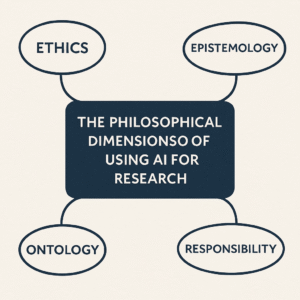 Artificial intelligence (AI) has become an increasingly powerful tool in the realm of research, transforming how knowledge is gathered, interpreted, and applied. As its influence grows, so too does the need to reflect on the philosophical implications of its use. Central to this discussion are questions about knowledge, agency, ethics, and the nature of understanding itself.
Artificial intelligence (AI) has become an increasingly powerful tool in the realm of research, transforming how knowledge is gathered, interpreted, and applied. As its influence grows, so too does the need to reflect on the philosophical implications of its use. Central to this discussion are questions about knowledge, agency, ethics, and the nature of understanding itself.
One of the most pressing philosophical concerns is epistemology—the study of knowledge. Traditionally, research has been seen as a human endeavour grounded in critical thinking, intuition, and contextual awareness. The use of AI in research challenges this model. AI systems, especially those based on machine learning, can process and synthesize enormous amounts of data at speeds far beyond human capacity. But can they truly “know” or “understand” what they produce? Philosophers debate whether AI-generated insights count as knowledge or whether they are merely patterns extracted without comprehension. This raises a deeper question: Is understanding required for something to be considered knowledge?
Another issue concerns agency and autonomy. When AI systems assist or even lead research processes, the lines blur between human and machine authorship. Who is responsible for the conclusions drawn— the human who programmed and guided the AI, or the AI system that discovered the insights? This becomes especially relevant in disciplines like scientific discovery or medical research, where errors can have real-world consequences. The delegation of intellectual labour to machines invites scrutiny over accountability and the loss of human judgment.
Ethical considerations are also central. AI can introduce bias if it is trained on unrepresentative or prejudiced data, potentially skewing research results and reinforcing existing social inequalities. The opacity of many AI systems, especially deep learning models, makes it difficult to identify how certain conclusions are reached. This lack of transparency conflicts with the academic ideal of open, replicable inquiry. Moreover, the use of AI can exacerbate inequalities in research, as access to powerful AI tools may be limited to wealthier institutions or nations.
The role of creativity and originality in research is another philosophical concern. AI can generate hypotheses, write papers, and even design experiments. But are these acts of true creativity, or are they elaborate forms of imitation and synthesis? Some argue that AI lacks the intentionality and consciousness that define genuine creativity. Others suggest that by collaborating with AI, humans might expand the boundaries of creative research.
Lastly, AI in research prompts questions about the future of human intellect. As we increasingly rely on machines to think for us, we risk diminishing our own cognitive abilities. Yet, some philosophers argue that AI could augment human intellect, allowing researchers to focus on higher-order thinking and conceptual innovation.
In conclusion, the use of AI in research is not just a technical shift—it is a profound philosophical one. It challenges our notions of knowledge, ethics, creativity, and human purpose. Engaging with these questions is essential if we are to use AI responsibly and wisely in the pursuit of understanding.

